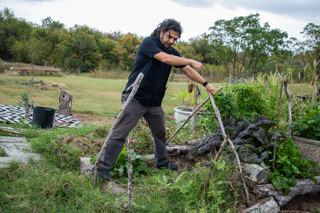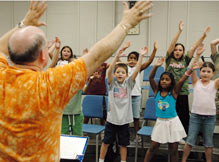By André Green/se news editor
Tears, hugs, laughter and smiles were abundant in the Century Room on SE Campus May 1 as the Cornerstone Program welcomed back one of its own.
After four months, Victoria Chiwara was released from an immigrant detention center.
While in the facility, Chiwara could think of nothing else but returning home. April 26 that thought became reality with an unexpected phone call from her Dallas-based attorney George Rodriguez.
“ My lawyer called Thursday night and said my case had been reopened and he would call me back and let me know when I was leaving,” she said.
A Knock at the Door
The Cornerstone student’s journey began early one January morning when Immigration and Customs Enforcement (ICE) agents holding a warrant for her arrest arrived at her home. Her family’s previous attorney had improperly filed asylum paperwork and the family subsequently became wanted by law enforcement.
Chiwara was taken to Dallas for processing and then transported to the Rolling Plains Detention Center in Haskell, where she would spend the next 125-plus days uncertain of her future.
Over the next two days, Chiwara was processed and then moved to her more permanent residence. The lone bright spot she found in those first 48 hours of captivity was the segregation from the convicts at the center. At no time, she said, were they ever housed together during her stay.
As she awaited word on her case, Chiwara developed a monotonous routine to occupy her time.
“ I would wake up around 5:30 [a.m.], clean up the room, take a shower, eat my breakfast” she said. “During the day, I would spend most of the time reading, watching TV for a little bit and then I would be in bed by around 10 [p.m.].”
Chiwara joked that her experience was almost like being grounded. The detainees never had to do any yard maintenance or manual labor. Meals were brought to them three times a day and they were allowed to go outside for an hour in the morning and in the evening.
She was also allowed to buy items from the commissary. She said she was very grateful for the money raised by her church, High Pointe Baptist Church in Cedar Hill, and her fellow students in the Cornerstone program.
Struggle to Cope
Although she was away from family and friends, Chiwara tried to remain optimistic. She quickly made friends with the other detainees with whom she was housed and likened her time in Haskell to “taking a vacation around the world.”
She made an effort to learn about different cultures and people while she was detained.
“ I tried to see the silver lining every day,” she said. “I met people from South Korea, Palestine, Vietnam, China and different parts of Africa.”
Chiwara credits the opportunity to meet different people everyday as an integral part of her keeping focus throughout her internment. She said she developed a friendship with one Guyanese woman in particular, and she hopes to keep in contact with her.
“ We would pray together, and she would encourage me whenever I was down,” she said. “I got to know her very well and it was very sad to leave her there.”
Other than reading, cleaning and praying, Chiwara also managed to pass the time by singing songs from Ol’ Blue Eyes, her favorite crooner.
“ I am a big Frank Sinatra fan,” she said. “I tried to remember every song he ever made.”
Even the facility warden Jill Weston, whom Chiwara also became close with, encouraged her to sing. Just days before learning of Chiwara’s scheduled release, Weston ordered musical equipment for her.
“ She liked hearing me sing,” she said. “She ordered a karaoke machine for me.”
Getting back into school mode was more than difficult for the student with the 4.0 GPA. Her concentration was affected as the constant though of her case kept her from properly focusing on her work, she said.
“ It was very hard to get into the mindset of school realizing the situation you are in,” she said.
“ Everyone, including Mrs. Weston, was really bent on helping me continue my schoolwork even though I couldn’t do it,” she said. “The environment wasn’t conducive to learning for the most part.”
Melissa Wells, a close family friend, visited Chiwara often bringing her schoolwork, money and support during every visit. Wells encouraged her not to give up and reminded her that there were people working hard for her and waiting for her to come home.
“ We were getting all of her things together so she would have something to do to distract her somewhat from her situation,” Wells said. “But being in the detention center was causing more distraction.”
Pessimism Creeps In
Wells noted as time passed, it became increasingly noticeable that Chiwara was becoming distraught.
“ She always tried to be in good spirits,” Wells said. “Some weeks were better than others.”
Chiwara tried to stay calm, but doubt began to creep into her mind once she neared two months in the facility. She was aware the longer she stayed in detention, the more likely she would be deported to her native Zimbabwe. Chiwara would be ineligible to return to the United States for 10 years if that happened.
Soon she found herself just settling on getting out of the facility, no matter where she ended up, she said.
She felt as if “life had slowed down” and everything she had worked for as well as her future plans were placed on hold.
However, she said when she felt she was bottoming out, she turned to faith and her friends and attorney trying to get her released.
“ I felt that God used that time to make me grow,” she said. “I didn’t like being there, but in retrospect, there are things I learned there that I wouldn’t have learned otherwise.
“ Being put in that situation allowed me to completely trust Him,” she said.
Journey back home
And just like that, Chiwara received word from Rodriguez that her case had been reopened.
“ He said, ‘I’m going to try to get you out and I’ll let you know when you are leaving,’” she said.
After receiving that call, Chiwara figured she would not actually leave for at least a few days. She knew she would have to travel back to Dallas for processing before being released. She also knew the immigration office in Dallas processed detainees only Sunday through Thursday, so the earliest she would probably leave would be Monday morning.
On Friday morning, Rodriguez called her back with unbelievable news, Chiwara said.
Rodriguez explained she did not have to go through the process of traveling back to Dallas and she could be released as soon as a family member could come and get her.
Wells immediately drove to Haskell to pick up an excited, albeit skeptical, Chiwara.
“ I was in shock,” she said. “I didn’t believe it until I actually walked out and saw Melissa. I told her ‘drive away, drive away fast before they come back and say they made a mistake.’”
Returning to TCC was the next thing on Chiwara’s mind. She called Dr. Linda Frazier, assistant professor of history, to tell her the good news.
“ I’m coming home,” she said.
She planned on surprising her Cornerstone classmates by returning Tuesday, May 1, but some of them were already aware, especially her good friend Samantha Windschitl.
Windschitl, along with Frazier, were instrumental in raising awareness to Chiwara’s plight as well as relaying school information and material to her through Wells. Windschitl became aware of her friend’s release via her grandmother and the evening news.
“ My grandmother called me and told me she saw Victoria on the news,” she said.
Windschitl said she saw the newscast and called Frazier to ask her if she knew anything.
“ How did you find out?” Frazier asked Windschitl. “You’re not supposed to know.”
Chiwara could not have imagined a better homecoming than what she received on SE as it became a May Day to remember. Flocked by students, faculty and the media, the Cornerstone leader could not answer questions about her ordeal fast enough.
Besides her mother and friends, Chiwara said what she missed the most was her piano. She stayed up for hours playing for fear she had forgotten how to play.
“ Mrs. Weston gave me a disposable camcorder and asked me to record myself playing the piano so she could see it,” she said. “She was a very nice lady and is someone I would like to stay in contact with. She gave Melissa flowers when she came to pick me up.”
Focus on Future
Chiwara’s focus now is finishing her studies and transferring to Baylor in the spring. Because of her detention, she fell behind in her studies. Additionally, she missed the opportunity to graduate with her class and lost her scholarship to Baylor but said she is not worried about it in the least.
There is one plus, however. She will get the chance to walk the stage with her classmates and finish the 10 hours she lacks by the end of the summer through independent studies. She will have earned her associate degree at the end of summer.
She plans to return to TCC in the fall to finish her remaining basic course work before transferring.
Through it all, she said she had to keep her faith and focus, not so much for herself, but for those fighting for her. It was difficult, she said, but in the end, everything worked out.
“ I knew there were a lot of people out there that were waiting for me, so I had to keep going and not give up,” a teary-eyed Chiwara said.
“ I just wanted to walk with my class and now I can.”




















